|
|
|
Sort Order |
|
|
|
Items / Page
|
|
|
|
|
|
|
| Srl | Item |
| 1 |
ID:
088933


|
|
|
|
|
| Publication |
2009.
|
| Summary/Abstract |
This article addresses the conflict over the Euphrates and Tigris waters from the perspective of negotiation theories, by examining the role of power in upstream/downstream negotiations. Conceptual and empirical links are established between water, negotiation (structure, process), power (asymmetries, coalition dynamics, strategies, development of alternatives) and security (direct/indirect interests such as national security, border security, territorial claims, economic development and environmental concerns). The study concludes that asymmetries in power have favored upstream/downstream interactions towards bilateral if not basin-wide arrangements. The framework shows that traditional elements of power, such as upstream positions, military and economic resources, do not constitute the only sources of power. Bargaining power can also determine the dynamics between respective riparians. Time constitutes an important source of power, and interests vary over time when political settings and security concerns shift. Downstream or more vulnerable riparians can invert situations of power asymmetry by acting on the basin-dominant riparian's interests and thus reduce its alternatives. Syria's use of 'issue-linkage' in its interactions with Turkey over water and wider security issues serves as the primary example.
|
|
|
|
|
|
|
|
|
|
|
|
|
|
|
|
| 2 |
ID:
088931


|
|
|
|
|
| Publication |
2009.
|
| Summary/Abstract |
In the first decade of the 21st century, 'hydrosolidarity,' the notion that water management should include considerations of ethics and equity, has influenced international approaches to conducting environmental research and formulating water policy. Since its inception in the 1990s, the term appears frequently across a spectrum of water-related research. It has accordingly permeated discourses and publications on water management. Such rapid proliferation of the concept has helped usher in a wave of transition from conflict management to cooperative efforts between upstream and downstream basin users, as well as a complex paradigm that links both human and environmental welfare. In this paper, we trace the intellectual origins and changing conceptions of hydrosolidarity. We outline some of its applications as well as various reactions to the concept. We close by discussing how the concept can help frame negotiations between riparian states and influence treaty-making and institution-building in river basin settings.
|
|
|
|
|
|
|
|
|
|
|
|
|
|
|
|
| 3 |
ID:
088928
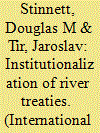

|
|
|
|
|
| Publication |
2009.
|
| Summary/Abstract |
This article seeks to expand our understanding of why states use international institutions to manage transboundary rivers. Agreements governing the use and management of international rivers can contain a variety of different institutional features. We address the question of why riparian states choose to include or exclude these features from river treaties. Our explanation focuses on the problem of securing post-agreement compliance. Institutions perform a variety of functions that help states maintain cooperation over time. We analyze this explanation using a data set of river treaties formed between 1950 and 2002. We find that the institutionalization of river treaties is associated with water scarcity, the flow pattern of shared rivers, trade interdependence, and the level of economic development. These findings have important implications for the possibility that rivers will be a source of future conflicts.
|
|
|
|
|
|
|
|
|
|
|
|
|
|
|
|
| 4 |
ID:
088935
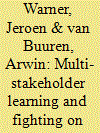

|
|
|
|
|
| Publication |
2009.
|
| Summary/Abstract |
This article analyzes the history of conflict and cooperation on the river Scheldt. Dutch-Flemish relations over the shared Scheldt estuary go back for centuries. Only in the past 10 years has there been intensive negotiation on a joint vision for its future which takes the form of a cooperative multi-stakeholder platform incorporating public, private and NGO representatives. Yet, relations have not always been cooperative; negotiations have been tense at times. After discussing the merits of a learning- versus a fighting-oriented analysis and capturing its dynamics in a TWINS matrix, this study proposes an approach that combines collaboration with competition, or learning and fighting. The case analysis finds that relations were often conflictual and cooperative simultaneously and warns against undue optimism about the multi-stakeholder process on the Scheldt estuary.
|
|
|
|
|
|
|
|
|
|
|
|
|
|
|
|
| 5 |
ID:
088927
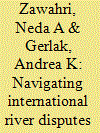

|
|
|
|
|
| Publication |
2009.
|
| Summary/Abstract |
Building on the findings from the International Negotiation's 2000 issue on negotiations in international watercourses and the major advances in the field during the past nine years, this issue seeks to advance our knowledge about the management of international river disputes. Collectively, the articles in this issue move beyond the simple dichotomy of conflict and cooperation to suggest the possibility that both are often simultaneously present within a basin and should be studied as such. Using a diversity of methodological approaches from comparative case studies to single case studies to quantitative analysis, the articles also illustrate the growth of institutionalization within river basins and their contribution to conflict management. Moreover, the articles advance our knowledge of the role of the relative distribution of power within the basin on the resolution of water disputes and management of resources. Some scholars find power asymmetry important for treaty formation, while others suggest that issue linkages and side payments can provide weaker riparians with the means to gain from cooperation.
|
|
|
|
|
|
|
|
|
|
|
|
|
|
|
|
| 6 |
ID:
088929


|
|
|
|
|
| Publication |
2009.
|
| Summary/Abstract |
The La Plata River Basin in South America, whose waters are shared by Argentina, Bolivia, Brazil, Paraguay and Uruguay, provides important lessons from the long history of negotiations over its shared water and other natural resources. In particular, innovative resource management practices developed over time have led to the relative harmony in which the riparian countries coexist. In this article, we analyze negotiation techniques within the La Plata River Basin by examining in detail the processes leading to the two seminal agreements - the 1969 Treaty of La Plata Basin and the 1979 Itaipú-Corpus Agreement. Based upon our analysis of the complex and often contradictory relationships between the riparian states, we evaluate the outcomes of both treaties from the standpoint of cooperation in the region and sustainable development. In doing so, we extend the relevance of the analysis to other basins with similar issues of regional management. The article extends the basin cooperation, through negotiation, to include trade agreements and development via project partnerships that draw in regional and global actors, including non-governmental organizations, environmental lobbies in foreign countries, and multinational development banks. The above actors are relevant for many parts of the world in today's era of globalization.
|
|
|
|
|
|
|
|
|
|
|
|
|
|
|
|
| 7 |
ID:
088934
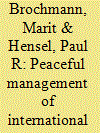

|
|
|
|
|
| Publication |
2009.
|
| Summary/Abstract |
As global water scarcity increases, both scholars and leaders have suggested that water will be a leading cause of future armed conflict. Yet other scholars argue that states typically cooperate rather than fight to manage their shared water resources. We address these arguments by examining the management of internationally shared rivers in the Americas, Western Europe, and the Middle East from 1900-2001. We propose hypotheses on the factors that lead states to become involved in disagreements over shared rivers as well as the factors that lead them to negotiate over these disagreements. Heckman probit analysis suggests that water scarcity - found by past work to be an important influence on armed conflict over rivers - is also an important influence on peaceful efforts to settle river problems; river claims are more likely where water supply is lower and demand is greater, but negotiations are also generally more likely in these same situations. Furthermore, while the existence of river treaties does not prevent the emergence of river claims, the presence of at least one treaty over the specific subject of the claim provides an important starting point that greatly increases the likelihood of negotiations over such claims. We conclude that the more pessimistic views of water management are missing an important part of the story. States are much more likely to negotiate in the most dangerous situations, and institutionalization of river resources can make an important contribution to negotiations over any disagreements that do emerge.
|
|
|
|
|
|
|
|
|
|
|
|
|
|
|
|
| 8 |
ID:
088932
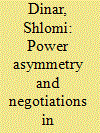

|
|
|
|
|
| Publication |
2009.
|
| Summary/Abstract |
Realist thinkers traditionally argue that when the upstream state is the river basin's hegemon, cooperation is least likely to materialize. Conversely, when the downstream state is the basin's hegemon, cooperation is likely to ensue, yet the agreement is often imposed and shaped along the interests of the stronger party. Implied in both scenarios is that the otherwise weaker riparian, in aggregate power terms, is not in a position to achieve its aims and satisfy its needs in an optimal fashion. Its capabilities are inferior to those of its adversary. In effect, it has little alternative but to accept the desires of the stronger riparian. By considering a set of international water agreements and hydro-political contexts, this article challenges the realist conception of power in international river basins. Particularly, it demonstrates that otherwise weaker states may influence the hydro-political context and subsequent international agreements. Cooperation, in general, materializes when both states, but particularly the stronger state, realize that benefits can accrue from coordination and joint action. In other words, to harness the river in an efficient manner, cooperation must ensue and the downstream state's participation is important. Even when the benefits to cooperation are not clear, i.e. when the upstream riparian does not foresee immediate economic incentives to cooperation, coordination may still be attained through the manipulation of incentives (or strategic interaction).
|
|
|
|
|
|
|
|
|
|
|
|
|
|
|
|
| 9 |
ID:
088930


|
|
|
|
|
| Summary/Abstract |
Third parties have been active in assisting adversarial states to navigate their international river disputes. By using the carrot and stick to facilitate compromise, mediators have also participated in the negotiations leading to the signing of treaties over international rivers. Yet, due to the nature of the issue confronting riparian states, the long-term impact of these efforts is likely to be unstable cooperation rather than cooperation. This is still an important contribution, because the absence of mediation efforts may contribute to an environment of conflict. However, since riparian states confront a relationship that involves the need to continuously manage disputes that arise as states develop their international rivers, a mediator may be more effective in facilitating cooperation if it assists developing states with a history of animosity to establish effectively designed river basin commissions and it oversees the implementation of treaties. Participating in the initial years of a treaty's implementation by coordinating the donor community to underwrite projects can minimize the potential disputes riparians confront. An effectively designed river basin commission can assist in facilitating cooperation long after the mediator has departed from the region. To demonstrate this argument, the article draws on the Indus River case, which has lived through four different phases. The Euphrates and Tigris Rivers are used to illustrate the argument's ability to explain other cases.
|
|
|
|
|
|
|
|
|
|
|
|
|
|
|
|
|
|
|
|
|